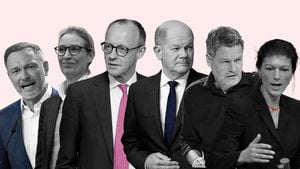Germany's political spectrum is shifting dramatically as Alice Weidel emerges as the first Chancellor candidate for the Alternative for Germany (AfD). With the parliamentary elections on the horizon, Weidel's leadership has positioned the party to potentially become the second-largest political force within the nation.
Once viewed as fringe, the AfD has cultivated its image under Weidel's guidance, which figures have indicated, is partly due to her pragmatic yet controversial approach to politics. The political climate, marked by rising discontent with immigration and globalization, resonates strongly with her voter base.
Weidel, who is openly gay and partners with Sri Lankan film producer Sarah Bossard, lives with their two children. Critics have been quick to point out the seeming contradictions of her identity versus her party's traditionalist values. Commentators note: 'She serves as the perfect 'fig leaf' for the AfD, enabling the party to distance itself from accusations of extremism'. Yet, beyond her personal life, Weidel aims to redefine the narrative surrounding the AfD, proposing strict immigration measures and advocating for of 'remigration,' the return of migrants to their countries of origin.
Political experts have analyzed Weidel's rise within the party since she joined the AfD shortly after its formation in 2013. Her background as an economist equipped her with the necessary skills to handle the political framework of the party, which transitions from initially liberal economic policies to more ethnonationalist discourse.
The party's core voter base largely hinges upon white, male individuals dissatisfied with the current political climate. Recent polling suggests support for the AfD has climbed to around 20%, bolstered by Weidel's adept messaging and highlighted through significant engagements with political figures both domestically and internationally.
One key moment of ascendancy was her livestreamed conversation with tech billionaire Elon Musk, who publicly endorsed the party, proclaiming, 'Only the AfD can save Germany.' Analysts argue Musk's involvement has legitimized the party's position, aligning it with global right-wing populism.
This culmination of public support and image familiarity has resulted from Weidel's positioning of the AfD as the voice against political elites and traditional left-right party structures. The party's hardline stance on immigration has painted it as the alternative for those feeling abandoned by established political groups.
Weidel's historical revisionism and comments relating to Germany's past raise eyebrows, particularly her framing of Adolf Hitler as 'a communist.' This has drawn sharp criticism but has nevertheless found resonance among some of her supporters.
Despite the challenges posed by the existing political firewall against cooperation with the AfD by most parties, Weidel's strategy includes appearing as the 'normal' face of the AfD, presenting the party's standard rhetoric with moderation—a tactic praised for its effectiveness by political scientists tracking her rise.
Faced with both praise and disparagement, Weidel continues to reinforce her image as the key figure driving the AfD forward. While the mainstream political establishment remains wary, polls suggest the electorate's increasing acceptance of the AfD's policies and presence speaks volumes about the changing dynamics within German politics.



